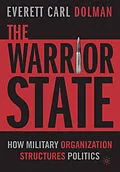Putting into question the conventional view that the military is detrimental to democratic development, Dolman provides a multifaceted examination of the institutional incentives of the military and its relations with civilian authorities. Drawing on classical political theory, a wide range of historical examples, and statistical findings, The Warrior State argues that the military can facilitate democracy as the result of specific norms and conditions that focus on individual action. Ironically, this may be best inculcated through a focus on the offensive, precisely the military doctrine commonly seen as most likely to result in international conflict. The paradox of offensive strategies possibly increasing international conflict while also enhancing democracy, which is supposed to decrease such conflict, from a core of this provocative book.
Autorentext
EVERETT CARL DOLMAN is Professor of Comparative Military Studies in the School of Advanced Air and Space Studies, at the United States Air Force University, Colorado, USA.
Inhalt
Arms and States: Introduction The Authoritarian Bargain and the Democratic Moment The Socio-Political Effects of Military Organization Proto-States: Athens and Sparta Early Modern Warfare: Swiss, Dutch, and French Military Reforms and the Transition to Democracy Military Organization and the Prusso-German State Post-Cold War Implications and the American Military Conclusions
